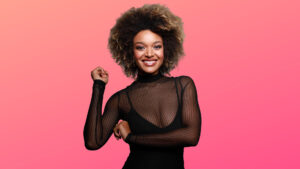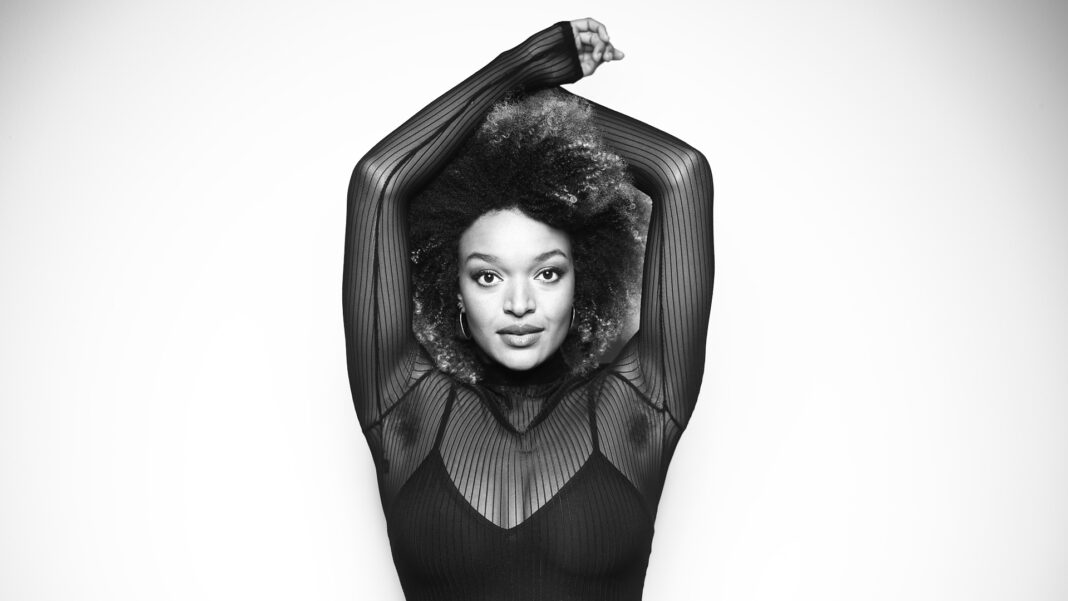
It was said that nothing could stop singer Sarah Vaughan. That proved to also be true of the 2021 Sarah Vaughan Vocal Jazz Competition when even COVID couldn’t interrupt it. Though delayed twice by the pandemic, once the competition took place there was a first-ever tie. Named as winners were Gabrielle Cavassa and Tawanda Suessbrich-Joaquim.
Tawanda has recorded and released her first album, Smile, on Resonance Records. The album, which we love, features a mix of standards (Smile, What a Little Moonlight Can Do) with songs by Donny Hathaway, Maureen McGovern and Sting.
On Wednesday, April 19th, Tawanda will perform at Baltimore’s Keystone Korner. Thursday, April 20th, Tawanda will appear at Chelsea Table + Stage in New York City to celebrate Smile. For those not in the area, there is also a livestream option that will be available.
Last week I spoke with Tawanda about the album, the pressures a young artist faces (particularly one who wins the same award that previously went to Cyrille Aimée, Jazzmeia Horn and recent Grammy winner Samara Joy), and the role of improvisation, not just in her music, but in her life. What follows are excerpts from our conversation that have been edited for length and clarity. To see the full interview, please go to our YouTube channel.
Since you are winner of the Sarah Vaughan International Vocal Competition, I want to ask you about something Vaughan said. “I just get on stage and sing. I don’t think about how I’m going to do it. It’s too complicated.” Is she right? Do you think instinct is more important than thought when performing?
Oh, I love that. Speaking as someone who is diving ever deeper into their performance and the way that I tell my stories, I’m trying to go from a place of thinking to a place of simply just being a conduit for the music and the stories. So I absolutely do think she’s right. I think when you’re overthinking it hinders your expression. But of course, with with genres like jazz, there is a lot of thought and tension that goes into it, especially if you’re improvising.
As a younger artist, what is the process for you of learning to trust that instinct?
It requires a deep vulnerability. That is kind of the journey. I think so often we get wrapped up in comparing ourselves to other people or overthinking the way we are being perceived. For me, it’s just about staying grounded in the moment, feeding off the musicians that I’m with and co-creating a space to deliver a message. So to put it more simply, I think just staying present is very important in that process.
Your album Smile was recorded during the pandemic. In a video that’s on Renaissance Records website you stated that you set out to offer hope, “to a world that was changing so much.” What did the album give you?
The album gave me belief in myself and strength. I always refer to the song titled I’m Okay, which was made popular by Dianne Reeves, because during that time I really wasn’t okay. I was having to show up to the studio and there was so much on my mind: struggling for the first time quite seriously with mental health issues like depression and anxiety. Then to get into the studio and sing these songs, specifically songs like I’m Okay. That’s a very assertive, very strong statement of all of these things have happened in my life and here I am now. And you know what? I’m okay. That was more of a manifestation and almost maybe a prayer for me during that time. So it just gave me that strength. Being so influenced by the person who produced it, George Klabin, he really thought that those messages were important, not only for me during that time, but just for everyone else in a time of of great confusion.
Given everything that went into making the album for you personally and emotionally, what’s your relationship when you hear the album now?
It’s so funny listening back to it. I firmly believe that you’re exactly where you need to be at every moment. During the time we were recording it, I did not feel ready. Listening back I think I sometimes get in my head about these quite difficult songs and they’re pretty involved. I wish that I could have approached them with all of the growth that I’ve done between now and then. I’ll get the chance to do so as I continue to perform them now. But I definitely listen back to the album and it’s almost like I can hear that little girl.
It almost felt like a loss of innocence. I don’t mean that in a very serious way. I just mean that I really kind of woke up. Listening to back to it, it definitely feels like all the growth I’ve done between now and then is striking to say the least.
You begin with Smile and you end with it a cappella version of Smile. How how is your relationship at the first version of Smile altered by the time you get to the a cappella version?
It’s lovely to open with a song that everybody knows and loves; a song that is so popular. I think by the end of the album, if you listen to it the whole way through, start to finish, which I hope that people do, then it kind of takes on this whole journey. Listening to it back in my head as I’m talking to you, it does seem like a mature delivery of life.
Josh Nelson, who arranged most of the songs on the album, had the idea of doing that a cappella and putting it somewhere within the album. I’m really glad we ended up choosing the end because it’s kind of a moment of reflection.
When you sing a song like Smile that the world knows because there have been countless recordings of it, what are the challenges that you give yourself so that your approach to the song is something we haven’t heard before?
The word smile, especially to women, always takes on a different tone because we’re kind of conditioned to be these happy, smiling creatures all of the time. As I said, during the time we were recording this, I didn’t want to be that person. I was literally down in the dumps. Why am I singing about smiles? So it ended up being so healing for me because I needed that reminder. That is what influenced me most to perform it the way that I did on the album. I may not always feel this way, but I need this reminder.
How do we smile when our heart is aching and breaking and remind ourselves that after moments of rain and cloudiness, the sun comes through and things get better. They always get better. Then they go back and then they go forward. It’s like this never ending cycle of ups and downs. I just let that guide me.
There’s a lot of pressure that an artist puts on themself when making their first album. That milestone is behind you now. Do you feel moving forward there is less internalized pressure or industry pressure for what follows?
I think so, yes. It’s always been my plan to do other kinds of music, too. So I see this as a very huge milestone. But I know it’s not the end and it doesn’t reflect what will come. It really feels like a first project. I didn’t come up with everything start to finish. I was presented with a lot of it. I trusted the producer because he’s really been taking me under his wing. But I look forward to the future. I have some things in the works now where I do have more creative liberty and it shows different sides of me and it does reflect more of who I am as well.
The pressure is definitely real and I definitely had some moments where I’m like, Oh my gosh, is this good enough? But I certainly hope it is. But now I have more of an understanding about the intention that goes into these things and I’ve gained a voice throughout all of this as well.
You sang I Guess I’ll Hang My Tears Out to Dry at the at the Sarah Vaughan competition. You said you were doing a song about endurance, which is, “a skill I’ve been honing.” You’re in the early stages of a career where endurance is definitely something that’s going to be required of you. Is the world today for any music artist, regardless of genre, infinitely more complicated than it might have been 25 years ago? How do you navigate all of that?
That’s something I think of every single day because I do not currently survive just off of music. I can’t. I live in L.A. I work full time. I have to. There’s no other choice. I’m looking forward to a day when I can supplement all of my income with my art. It’s definitely changed a lot and with social media, too.
There was a time in my life when I felt totally comfortable sharing literally each and everything about my life. But then during COVID, I was off Instagram and social media for a year. It felt so good to not have to exist in multiple places at one time. I can just be me myself.
As we started recording this album and I started doing more shows, it became a requirement for me to be back on social media. That’s just how the world works now. You really have to find a persona that is marketable and become, I hate to say this, but like a prostitute of sorts on social media. It’s so tricky.

It really kind of breaks my brain because artists need to be vulnerable to create and authentic. But is it truly authentic if every moment that we’re sharing is curated? It’s this huge philosophical question that I will have to be diving into as social media and technology ever more creep into our way of living. But yeah, it’s definitely tough. I’m finally getting back to a place where I can just be myself and just feel comfortable sharing that about me.
You said also in the promotional video that is on Resonance Records website, and you were quoting your sister, who said, “I don’t think people understand jazz if they haven’t had heartbreak.” Does that mean your understanding of this music also comes from that heartbreak?
Oh, yeah. 100%. I’m so influenced by the pain that I have felt in life. The moments where I had no other choice but to live creatively. As someone who is very independent, there are those things that sometimes you find yourself maybe lacking and it puts you into survival mode. But it just ends up informing your life and allowing you to be more creative. Then you can use all of those experiences as different colors to better paint these pictures.
I feel like I’ve always had this kind of sad soul. Not sad, but sad in the way that I love to analyze hurt. I love to feel things very deeply. I feel like very sensitive. I feel like those things really help me when I am creating.
I want to ask you about something that George Gershwin said. He said, “Life is a lot like jazz. It’s best when you improvise.” How do your jazz skills help you improvise and navigate your way through life?
I want to talk a little bit about my parents, because I think they were my original improvisers with life. I’m a first generation American. My mom’s from Germany and my dad is from Mozambique, Africa. He ended up in Germany when the wall was up. He was on one side of Germany, my mom was on the other side. The wall came down, they met, and then they ended up moving here to the United States.
You have to have a plan for where you’re going. Maybe not necessarily a plan, but you have to get really good at kind of just picking up and leaving; going with the flow. I think that aspect of life was shown to me and my sister from a young age and it’s definitely influenced the way that I live my life.
I feel like a pretty independent person and I feel like I love change. I love change and I love getting creative with life. I love getting creative with each individual moment, creating something out of nothing. I feel like that has influenced my improvisation. It’s definitely been a life full of improv, I can tell you that. And I’ve had a lot of fun with it.
To watch the full interview with Tawanda, please go here.
All photos by Jeff Xander/Courtesy Chelsea Table + Stage











